CwC
3. Digital Aid: Game-Changing Humanitarian Transformation
Presenter: Ms. Gwi-Yeop Son, Director, Corporate Programmes Division, UN Office for the Coordination of Humanitarian Affairs (OCHA)
Wednesday, 29 April 2015, 09:20-09:40
The number of people in need of humanitarian assistance has almost doubled over the past ten years, and is expected to keep rising. The global humanitarian system is at a crossroads and only through partnership and innovation is it possible to meet these unprecedented humanitarian needs.
Providing information and two-way communication are now an integral part of humanitarian response. The network age is re-shaping humanitarian response and the communications revolution continues to have a profound impact on the way people survive and respond to emergencies.
UN OCHA works to ensure humanitarian response is as coordinated and effective as possible, to find a consensus on the problem, the priorities, and what needs to be done to ensure people who are affected receive the aid they need. Gwi called on WGET participants to work together to develop game-changing approaches to enable digital aid and harness technology to build resilience and to provide assistance more effectively.
Gwi could not attend the 36th WGET Forum owing to the response requirements of the earthquake that struck Nepal on 25 April. WGET Chair Patrick Gordon delivered her remarks.
Ms. Gwi-Yeop Son, Director, Corporate Programmes Division, UN Office for the Coordination of Humanitarian Affairs (OCHA)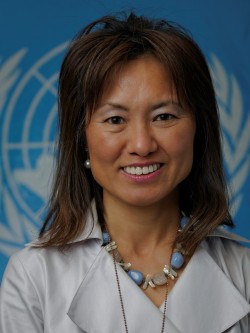
Ms. Gwi-Yeop Son began her career in Haiti, assisting HIV/AIDS patients with a non-governmental organisation called the Death and Dying Institute. She then worked with the Country Women’s Association of Nigeria, focusing on micro-finance schemes, before taking up a position as Assistant to the Managing Director of Lehman Brothers.
In 1994, Ms. Son joined UNDP and had a number of positions including in Somalia as a Programme Officer in 1994, Assistant Resident Representative of the Governance and Environmental Management Division in Lao PDR in 1996, Special Assistant to the Assistant Administrator with UNDP’s Bureau of Management in 1998, Deputy UNDP Representative in East Timor in 2000, Programme Advisor on Afghanistan in 2002, Country Director of UNDP Indonesia in 2003, and United Nations Resident Coordinator and UNDP Resident Representative in Thailand in 2007.
In May 2011, Ms. Son took up the post of Director of Corporate Programmes of the United Nations Office for the Coordination of Humanitarian Affairs (OCHA). In this role Ms. Son holds direct oversight over OCHA’s work on communication, information management and policy development, as well as the Central Emergency Response Fund (CERF) and the Country Based Pooled Funds including Emergency Response Fund (ERF) and Common Humanitarian Fund (CHF). Ms. Son also has ultimate responsibility for OCHA’s administrative functions and oversees the World Humanitarian Summit Secretariat which will help organize the first ever Humanitarian Summit in 2016.
Links to related material:
UN Office for the Coordination of Humanitarian Affairs
World Humanitarian Summit
8. Prepositioning Relationships and Technology to Better Communicate with Communities in Disaster Response
Panelists: Ms. Angela Rouse, Senior Programme Manager, CDAC Network Secretariat; Mr. Mike Adams, International Coordinator, First Response Radio; Mr. Gil Arevalo, Communications with Communities Coordinator, UN Office for the Coordination of Humanitarian Affairs (OCHA)
Wednesday, 29 April 2015, 11:40-12:20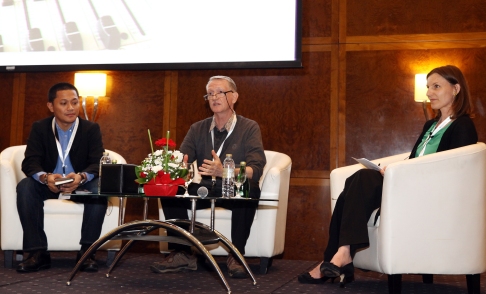
In the days and weeks following a disaster, information and the means to communicate – both with each other and with responders – are crucial for the survival and well-being of communities. They also play a key role in early warning. The humanitarian response system has the know-how and technology to enable this to happen as a matter of course, and yet it persists as a major challenge.
Gil, Mike and Angela discuss the communication needs of communities and what it means for the humanitarian system: looking at how we can address this systemic challenge early and collectively, through partnership across traditional boundaries and with genuine commitment to put people first.
Ms. Angela Rouse, Senior Programme Manager, CDAC Network Secretariat
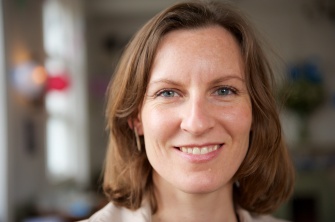 Angela is currently Senior Programme Manager for the Secretariat of the Communicating with Disaster Affected Communities (CDAC) Network. The Network is a unique collaboration between NGOs, UN agencies, media development
Angela is currently Senior Programme Manager for the Secretariat of the Communicating with Disaster Affected Communities (CDAC) Network. The Network is a unique collaboration between NGOs, UN agencies, media development
agencies, technology providers and others that crosses traditional boundaries to leverage improvements both in information sharing for communities, and two-way communication between humanitarian responders and disaster-affected people, as well as between disaster affected people themselves. Angela leads the implementation of the Network’s capacity strengthening work and manages the programme team. “Ultimately I want to see humanitarian responses where community voices truly shape programmes and decisions, and where communities, duty bearers and responders work together to implement the responses.”
Prior to joining the CDAC Network in November 2013, Angela was the Emergency Capacity Building Manager for CARE International and brings rich experience of interagency collaboration across various initiatives, accountability in practice, training design and delivery, and evaluative work. Angela has a strong programmatic background, having spent many years working in the Democratic Republic of Congo, Uganda and Kenya across various sectors, including primary health care, gender-based violence, and water, sanitation and hygiene. She has worked in the humanitarian sector for over ten years, prior to which she worked in scientific research following an education in biology and public health.
Mr. Mike Adams, International Coordinator, First Response Radio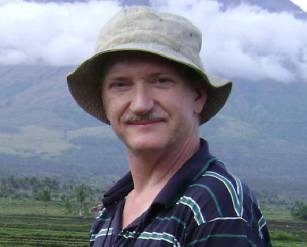
Originally from Seattle, Washington, Mike started his career as an aircraft radio technician. He has worked as a broadcast engineer since 1987 with experience in SW transmitters, antennas, studios and Mike’s favorite – AM radio remote broadcasts. In 2003 he received Society of Broadcast Engineers (SBE) certification as a Professional Broadcast Engineer for 20 years experience in radio.
Mike began working as a consultant with Health Communications Resources (HCR) after the 2004 Asian tsunami where they worked together with a local partner to put an Emergency FM radio station on the air in Indonesia. After seeing the value of radio after a disaster, he has worked to develop the Rapid Response Radio Unit (RRRU) that can be deployed anywhere in the world within 72 hours of a disaster.
The network of participating stations is called FIRST Response Radio and Mike has been serving as the international coordinator since the start. Since 2007, Mike has led Rapid Response Radio Workshops and field trials in the Philippines, India and Indonesia teaching teams to use radio in humanitarian relief for the affected communities following disasters.
A RRRU team was led by Mike into the flooded Kosi river region of Bihar, India in 2008 to establish radio broadcasts to assist the 3 Million people affected by the flood. He also led a team into Sumatra Indonesia following the Sept 2009 Earthquake, establishing an FM station within 5 days of the disaster. Mike most recently took a team into the most affected community in Tacloban, Philippines following typhoon Haiyan/Yolanda where all radio and TV stations were off the air. The team arrived on the 5th day and were broadcasting on the 6th day after the powerful typhoon.
Mike received a Bachelor of Science in Electrical Engineering (BSEE) from Washington State University in 1984. Mike is married, has two daughters and currently lives in Cambodia.
Mr. Gil Arevalo, Communications with Communities Coordinator, UN OCHA
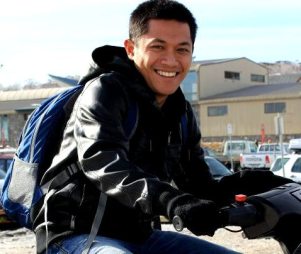 Gil Francis Arevalo has twelve years of experience in the field of media, communication, humanitarian and emergency response, community engagement, youth development, disaster risk reduction and management and climate change adaptation. Since 2003, he has worked in different capacities with various organizations like the Philippine Daily Inquirer, Save the Children-US, YMCA-Japan, Oxfam-GB, UNFPA and UNDP.
Gil Francis Arevalo has twelve years of experience in the field of media, communication, humanitarian and emergency response, community engagement, youth development, disaster risk reduction and management and climate change adaptation. Since 2003, he has worked in different capacities with various organizations like the Philippine Daily Inquirer, Save the Children-US, YMCA-Japan, Oxfam-GB, UNFPA and UNDP.
Currently, he is with the United Nations Office for the Coordination of Humanitarian Affairs (OCHA) – Philippines as Communications with Communities (CwC)/Accountability to Affected Populations (AAP) Coordinator, establishing and leading a CwC/AAP preparedness working group at the national level, which is designated to facilitate coordination for communications with disaster-affected communities practitioners in partnership with the Government of the Philippines, CSOs, INGOs, media, private sectors, telecommunication companies, and faith-based groups.
He provided proper coordination through the Community of Practice of CwC/AAP and technical support during successive emergencies and disasters in 2013: Zamboanga armed conflict, Bohol earthquake, and typhoon Haiyan; and also as part of preparedness initiative during typhoon Hagupit in 2014 and typhoon Maysak in 2015.
Links to related material:
The CDAC Network
First Response Radio
First Response Radio Tacloban Deployment
UN Office for the Coordination of Humanitarian Affairs – Philippines